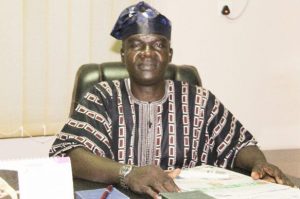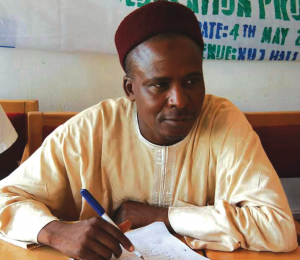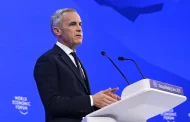The Nigeria Union of Journalists, (NUJ), has read what appears to be a riot act on hate speech transmission to its members. NUJ President, Mr Waheed Odusile told an Abuja workshop on hate speech Tuesday that there must be a country called Nigeria before there could be Nigerian journalists, meaning it is about time for every journalist to know what to avoid or what is unprofessional. Media, he said, is about development, not destruction. This, he said, is why the NUJ is working on the orientation of journalist to avoid certain things, no matter who is making the speech once it could bring death or loss of limb to someone.

NUJ President, Abdulwaheed Odusile
It was neither all consensus nor discordant tunes at the workshop where hate speech took centre stage. Nobody among media unions, (the Nigerian Guild of Editors, the NUJ, RATTAWU, GOCOP, Bloggers Association, etc), academics and policy makers interrogating “The Media and Hate Speech in Nigeria” denied that hate speech is real but it was not everyone who accepted that it could be determined. Other areas of debate included whether or not the solution to hate speech and fake news lie in state exercise of some control on the social media; whether bloggers need to come to grips with the demands of professional journalism or be left alone as a genre in itself; the potency of impending fragmentation of Mass Communication into standalone degree courses in Journalism, Broadcasting, Film and Multimedia Studies, Public Relations, Advertising and Development Communications as a response to observed crisis of inadequate intellectual grooming of journalists vis-a-vis conflict sensitive reporting as well as the question of whether or not traditional media is free of complicity in hate speech transmission, leaving only new media.
The workshop put together by the Centre for Information Technology and Development, (CITAD) and backed by MacArthur Foundation is a sequel to previous public hearing and sensitisation campaign on observable rising hate speech phenomenon across Nigeria, most signposted by certain instances of such in the 2015 General Elections. These, according to participants at the workshop, were the broadcasts on then presidential candidate, Muhammadu Buhari, APC bigwig Bola Ahmed Tinubu and a wrap-around advertisement doubting then candidate Buhari surviving his tenure if he won the election. Background researcher for the workshop told attendants why the said materials were considered red lines in hate speech: two of them were carried on the network of two national broadcasters, one of them being the Nigerian Television Authority, (NTA) which is expected to be the standard bearer in the industry.
Stung by the ‘red lines’ of 2015, certain NGOs, particularly CITAD, have since been exploring how to undermine hate speeches, starting from monitoring its dynamism on social media, compiling key phrases and terms used as well as conscientising the public on how to refuse to be provoked by hate speeches. But if such key phrases and terms are language usage whose meaning is in the eye of the beholder, then is the concept of hate speech not an indigestible meal in a highly pluralistic society where consensus on basic building blocks of civility have not yet been arrived at? In such circumstances, couldn’t hate speech also be understood as serving an early warning or a call to action for peace practitioners in favour of widening inter-subjective space between those using it and those they paint as enemies?

Mallam Y Z Y’au, Executive Dir, CITAD

Too routinely controlled by the government to serve the ‘biopolitical’ essence of its existence, even for the government
Although he did not dismiss the subjectivity of hate speech inferences, Mallam Y Z Y’au, CITAD Executive Director who responded to that poser argued that there now exists a definition of hate speech. Echoing Professor Umar Pate, an earlier speaker at the workshop hinted, the ED said hate speech is always about communication that deliberately targets groups to put them at certain disadvantage on the strength of particular parameters, creating enemy images of such a targeted group.
This objectivist conception of hate speech which appealed to a majority of the participants had its most reasoned or articulate defender in Mr Waheed Odusile, the President of the Nigerian Union of Journalists, (NUJ) who told a story to reinforce it. The story told him by a former journalist is about the anger of a former military governor in one of the Northwestern Nigerian states over an otherwise straightforward factual story of a headmaster impregnating a pupil. When the reporter responded to the governor’s summoning, his defence was that the story was justified because it, indeed, happened. That was until the governor told him how his ‘stupid’ story had completely rubbished his entire campaign conscientising parents in the state to allow their daughters go to school. All the parents were going to read or hear about the story and follow it up with even withdrawing their daughters from the schools.
The NUJ boss used the story to stress the imperative for responsibility in reporting but it illustrated one of the contending views on the difficulty of determining hate speech as a straightforward factual story in the eyes of an objectivist reporter turned into a value issue in the eyes of a governor. But Odusile maintained his position, saying the union had identified hate speech as a threat to the survival of the society and democracy in Nigeria.
Our own definition of hate speech is any type of comment that brings the other party to scorn, hatred or unworthiness, he said, adding how the NUJ has been working along with the International Federation of Journalists, the Ethical Journalism Network in the UK to hold a conference thereto in Kenya, Doula and Abuja. The NUJ, he revealed is actually compiling a glossary of what it considers hate speech which it would soon launch.
 He further reported what the union told the Sultan of Sokoto recently during its NEC meeting in the state: asking traditional rulers to buy into hate speech campaign and refrain from setting the country on fire by what they say. His argument is that journalists do not create but only report what someone else said or says. “If no one said it, it won’t be reported”. Beyond traditional rulers, the NUJ is also working along with the Advertising Practitioners Council of Nigeria, (APCON) from where advertisement copies come to media houses. This was stressed because the most cited hate speech today is the Governor Ayodele Fayoshe’s 2015 wrap around on candidate Buhari, not a news item.
He further reported what the union told the Sultan of Sokoto recently during its NEC meeting in the state: asking traditional rulers to buy into hate speech campaign and refrain from setting the country on fire by what they say. His argument is that journalists do not create but only report what someone else said or says. “If no one said it, it won’t be reported”. Beyond traditional rulers, the NUJ is also working along with the Advertising Practitioners Council of Nigeria, (APCON) from where advertisement copies come to media houses. This was stressed because the most cited hate speech today is the Governor Ayodele Fayoshe’s 2015 wrap around on candidate Buhari, not a news item.
Taking a hard line in relation to bloggers, the NUJ President said they should go and be trained if they wanted to be reckoned with as journalists and that otherwise, they were no more than technology enhanced ‘Amebo’ of the Village Headmaster series on Nigerian Television Authority, (NTA) in the 1980s. Contrasting bloggers to online platforms whom he said are actually newspapers, Mr Odusile said bloggers insert themselves or their personal interests in the stories they circulate and have, therefore, injured the core of journalism which he put at disinterested or objective reporting. Asserting that the kind of sensationalism, falsehood and disinformation people are complaining about rarely occur in the mainstream media, the president argued that nobody is asking bloggers to go get a Bachelors Degree in Mass Communication but to go over to the NUJ to learn how to be responsible to the society. “If you set society on fire, you won’t know where the phone you are using is”, he drew the attention of bloggers whose official, Prince Chuks, was at the workshop and had spoken earlier on.
In the second part of this report, the story of this workshop and the NUJ President’s riot act will be told from the beginning since many other speakers took the floor before Mr Odusile spoke.




























